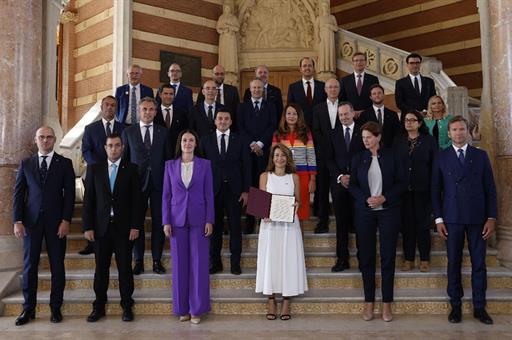EU transport ministers adopt the Barcelona Declaration to promote mobility that fosters social and territorial cohesion
News - 2023.9.22
Entitled 'Mobility for people: promoting social and territorial cohesion', the declaration highlights the importance of deploying a transport system that facilitates access to other rights, such as education, work, health or housing; as well as helping to mitigate inequalities and increase the resilience of our societies, with a gender perspective.
Thus, the document, signed within the framework of the Spanish Presidency of the Council of the European Union, sets out the way to achieve effective connectivity throughout the European Union, both in urban centres and in sparsely populated areas or areas with orographic difficulties. This is a step already initiated by the European Commission with the European Green Pact or the Sustainable and Smart Mobility Strategy.
During the press conference following the informal meeting of transport ministers, Raquel Sánchez and the European Commissioner for Transport, Adina Vălean, highlighted the agreement reached between all Member States to continue working together with the European Commission to provide European citizens with mobility that meets their needs, leaving no one behind.
"It has undoubtedly been a very satisfactory debate, which should relaunch political commitment and the implementation of the measures needed to ensure European transport and mobility respond to a socially and territorially cohesive network", stressed the minister before emphasising that "it is essential to work to ensure that transport and mobility policies are aimed at improving people's quality of life".
Raquel Sánchez explained that their duty as European transport ministers is to "design policies in such a way as to facilitate all the rights that define the European Union" and stressed the need to work together at all levels to "guarantee comprehensive solutions for citizens".
In this sense, the Transport Minister pointed out that "mobility is a right that must be exercised under equal conditions, regardless of whether we live in a city or a small town, whether our income level is high or low, whether we have physical limitations or not, or whether we have a private vehicle or not". She stressed that "all modes of transport play a fundamental role in facilitating territorial and social cohesion and Europe's internal and external connectivity".
Rural and cross-border mobility, key to the Declaration
The European ministers, joined by representatives of the European Free Trade Association (EFTA) and the European Commission, discussed how European transport policy can contribute to social and territorial cohesion, within and beyond national borders, and shared experiences and innovative initiatives to achieve this.
They agreed that promoting an integrated and accessible transport network should be one of the priorities of public administrations. For this reason, the Barcelona Declaration emphasises the need to adapt mobility solutions to the specific characteristics of each context, always counting on the participation of its inhabitants in the design and implementation of new policies.
In particular, the European representatives discussed mobility systems in areas in demographic decline, recognising the importance of developing sustainable rural mobility strategies, in accordance with the respective competences at national level.
In this regard, ministers asked the European Commission to promote the exchange of ideas on how to harness transport and mobility as tools for social and territorial cohesion, considering the challenges of urban and rural, island, peripheral, mountainous, and especially cross-border and sparsely populated areas.
For example, they call for Commission support to initiate innovative pilot projects in areas of demographic challenge to promote mobility that is more responsive to people's needs, making efficient use of public resources and enhancing the development of cross-border passenger rail infrastructure and services in the Union.
Equality and inclusion at the heart of transport policies
The role of women in transport is also included in the Barcelona Declaration, highlighting the importance of incorporating a gender and equality perspective into the design of transport and mobility policies, starting with the collection of statistics that provide sufficiently disaggregated data.
In addition, Member States have stressed the importance of mitigating cases of mobility poverty within the EU. To this end, they are committed to providing comprehensive and consistent data to assess transport inequality.
The Barcelona Declaration recalls that accessibility should also be among the main priorities of any transport system, with special attention to people with disabilities and/or reduced mobility.
The document also points out that safety is a fundamental pillar in transport, underlining the importance of implementing road safety strategies that include measures for road users, and investments in infrastructure to help protect the most vulnerable, especially pedestrians, cyclists and motorcyclists.
Towards more sustainable, resilient and digital transport
With this declaration, the Spanish presidency is moving closer to the main objective of continuing the transformation already underway in the transport sector to make it more sustainable, resilient and digital.
Ministers committed to push for policies that foster progress in technology and digital transformation, such as intelligent transport systems, real-time data analytics, data sharing environment and mobile applications that can improve the efficiency, reliability and resilience of mobility and transport services and thus the user experience of transport services.
They also highlighted the need to promote and encourage progress in the decarbonisation of all modes of transport and recognised the role of promoting competition, multimodality and the resilience of the transport network, both for passengers and freight.
Non official translation





